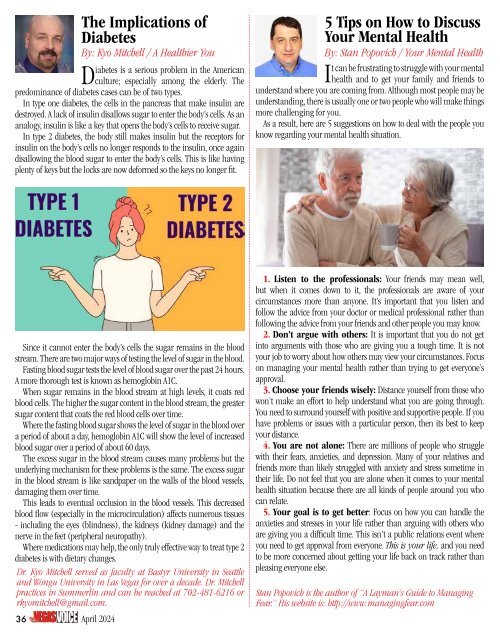Create successful ePaper yourself
Turn your PDF publications into a flip-book with our unique Google optimized e-Paper software.
The Implications of<br />
Diabetes<br />
By: Kyo Mitchell / A Healthier You<br />
Diabetes is a serious problem in the American<br />
culture; especially among the elderly. The<br />
predominance of diabetes cases can be of two types.<br />
In type one diabetes, the cells in the pancreas that make insulin are<br />
destroyed. A lack of insulin disallows sugar to enter the body’s cells. As an<br />
analogy, insulin is like a key that opens the body’s cells to receive sugar.<br />
In type 2 diabetes, the body still makes insulin but the receptors for<br />
insulin on the body’s cells no longer responds to the insulin, once again<br />
disallowing the blood sugar to enter the body’s cells. This is like having<br />
plenty of keys but the locks are now deformed so the keys no longer fit.<br />
5 Tips on How to Discuss<br />
Your Mental Health<br />
By: Stan Popovich / Your Mental Health<br />
It can be frustrating to struggle with your mental<br />
health and to get your family and friends to<br />
understand where you are coming from. Although most people may be<br />
understanding, there is usually one or two people who will make things<br />
more challenging for you.<br />
As a result, here are 5 suggestions on how to deal with the people you<br />
know regarding your mental health situation.<br />
Since it cannot enter the body’s cells the sugar remains in the blood<br />
stream. There are two major ways of testing the level of sugar in the blood.<br />
Fasting blood sugar tests the level of blood sugar over the past 24 hours.<br />
A more thorough test is known as hemoglobin A1C.<br />
When sugar remains in the blood stream at high levels, it coats red<br />
blood cells. The higher the sugar content in the blood stream, the greater<br />
sugar content that coats the red blood cells over time.<br />
Where the fasting blood sugar shows the level of sugar in the blood over<br />
a period of about a day, hemoglobin A1C will show the level of increased<br />
blood sugar over a period of about 60 days.<br />
The excess sugar in the blood stream causes many problems but the<br />
underlying mechanism for these problems is the same. The excess sugar<br />
in the blood stream is like sandpaper on the walls of the blood vessels,<br />
damaging them over time.<br />
This leads to eventual occlusion in the blood vessels. This decreased<br />
blood flow (especially in the microcirculation) affects numerous tissues<br />
- including the eyes (blindness), the kidneys (kidney damage) and the<br />
nerve in the feet (peripheral neuropathy).<br />
Where medications may help, the only truly effective way to treat type 2<br />
diabetes is with dietary changes.<br />
Dr. Kyo Mitchell served as faculty at Bastyr University in Seattle<br />
and Wongu University in Las Vegas for over a decade. Dr. Mitchell<br />
practices in Summerlin and can be reached at 702-481-6216 or<br />
rkyomitchell@gmail.com.<br />
36<br />
<strong>April</strong> <strong>2024</strong><br />
1. Listen to the professionals: Your friends may mean well,<br />
but when it comes down to it, the professionals are aware of your<br />
circumstances more than anyone. It’s important that you listen and<br />
follow the advice from your doctor or medical professional rather than<br />
following the advice from your friends and other people you may know.<br />
2. Don’t argue with others: It is important that you do not get<br />
into arguments with those who are giving you a tough time. It is not<br />
your job to worry about how others may view your circumstances. Focus<br />
on managing your mental health rather than trying to get everyone’s<br />
approval.<br />
3. Choose your friends wisely: Distance yourself from those who<br />
won’t make an effort to help understand what you are going through.<br />
You need to surround yourself with positive and supportive people. If you<br />
have problems or issues with a particular person, then its best to keep<br />
your distance.<br />
4. You are not alone: There are millions of people who struggle<br />
with their fears, anxieties, and depression. Many of your relatives and<br />
friends more than likely struggled with anxiety and stress sometime in<br />
their life. Do not feel that you are alone when it comes to your mental<br />
health situation because there are all kinds of people around you who<br />
can relate.<br />
5. Your goal is to get better: Focus on how you can handle the<br />
anxieties and stresses in your life rather than arguing with others who<br />
are giving you a difficult time. This isn’t a public relations event where<br />
you need to get approval from everyone. This is your life, and you need<br />
to be more concerned about getting your life back on track rather than<br />
pleasing everyone else.<br />
Stan Popovich is the author of “A Layman’s Guide to Managing<br />
Fear.” His website is: http://www.managingfear.com
















